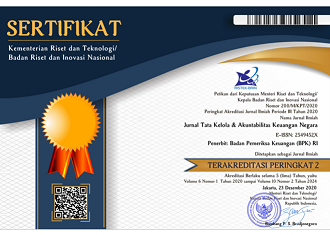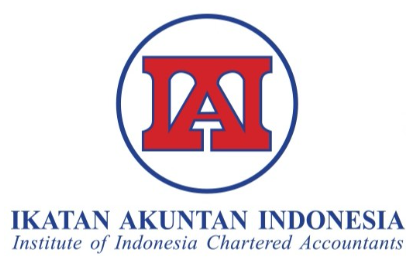Analysis of Business Process Management Principles in Performing Remote Audit at the Audit Board of the Republic of Indonesia
DOI:
https://doi.org/10.28986/jtaken.v9i1.1137Keywords:
Business Process Management, Remote Audit, Indonesia Audit BoardAbstract
The Audit Board of the Republic of Indonesia must quickly adapt to its duties in the COVID-19 pandemic era. BPK forced all work to be done remotely. This study aims to analyze the application of Business Process Management Principles (BPM) in conducting remote audits at BPK following the COVID-19 pandemic. This study applies the descriptive qualitative with study literature and Likert survey on seven representative offices of BPK. The analytical tool used is BPM Principles with pattern matching. The results show that BPM principles in the remote audit have accomplished various implementation qualities. The result is divided into two types: principles that have worked properly and principles that have not maximally worked. The appropriately worked principles are context awareness, enablement, holism, continuity, institutionalization, purpose, and technology appropriation. The BPM principles that have been implemented but not maximized are the principle of involvement, the principle of joint understanding, and the principle of simplicity. Remote audits can only be conducted smoothly if all principles are implemented accordingly.
References
BPK RI. (2014). BPK Decree Number 4/K/I-XIII.2/7/2014 concerning Guidelines for Implementation of Financial Audit (Keputusan BPK No 4/K/I-XIII.2/7/2014 tentang Petunjuk Pelaksanaan Pemeriksaan Keuangan). Jakarta: BPK RI
BPK RI. (2015). BPK Decree Number 5/K/I-XIII.2/10/2015 concerning Audit Management Guidelines (Keputusan BPK No 5/K/I-XIII.2/10/2015 tentang Pedoman Manajemen Pemeriksaan). Jakarta: BPK RI
BPK RI. (2017). BPK Regulation Number 1 Year 2017 concerning State Financial Audit Standards (Peraturan BPK RI Nomor 1 Tahun 2017 tentang Standar Pemeriksaan Keuangan Negara). Retrieved from https://www.bpk.go.id/ page/standar-pemeriksaan-keuangan –negara
BPK RI. (2020). Regulation of the Secretary-General Number 22 of 2020 concerning Methods for Auditing State Finances in Emergencies (Peraturan Sekretaris Jenderal Nomor 22 Tahun 2020 tentang Metode Pemeriksaan Keuangan Negara dalam Keadaan Darurat). Jakarta: BPK RI
BPK RI. (2021). Pemeriksaan jarak jauh. Jakarta: BPK RI.
BPK RI. (2022). Warta Pemeriksaan: Pemeriksaan jarak jauh, adaptasi baru di era new normal. Jakarta: BPK RI.
Buh, B., Kovačič, A., & Štemberger, M. I. (2015). Critical success factors for different stages of business process management adoption – a case study. Economic Research-Ekonomska Istraživanja, 28(1), 243-258. DOI: 10.1080/1331677X.2015.1041776
Butarbutar, T. E., & Pesak, P. J. (2021). Pengaruh work from home dan independensi terhadap kualitas audit internal Aparat Inspektorat dalam pengawasan keuangan daerah Kota Manado selama masa pandemi (studi empiris pada Inspektorat Kota Manado). Jurnal Riset Akuntansi dan Auditing “Goodwill”, 12(2), 366-376.
Devika, N., Sharifah, L., & Syed A., (2016). Measuring business process management using business process orientation and process improvement initiatives. Business Process Management Journal, 22(6), 1069-1078.
Farcane, N., Bunget, O. C., Blidisel, R., Dumitrescu, A. C., Deliu, D., Bogdan, O., & Burca, V. (2022). Auditors’ perceptions on work adaptability in remote audit: a COVID-19 perspective. Economic Research-Ekonomska Istraživanja, 36(1), 1–38. DOI: 10.1080/1331677X.2022.2077789
IIA. (2021). The remote auditor: Challenges, opportunities, and new ways of working. Retrieved from https://www.theiia.org/en/content/research/foundation/2021/the-remote-auditor-challenges-opportunities-and-new-ways-of-working/
Institut Akuntan Publik Indonesia. (2015). Standar Audit 200. Retrieved from http://spap.iapi.or.id/1/files/SA%20200/SA%20200.pdf
Internal Audit Foundation. (2021). The remote auditor. Retrieved from https://www.theiia.org/globalassets/documents/internal-audit-foundation/research-and-reports/iaf-report-the-remote-auditor-1.pdf
Ismanidar, N., Maksum, A., Gultom, P., & Meutia, R. (2022). The effect of auditor competence and remote audit support on audit quality through digital-based governance with information technology as moderating variable in state financial audit. International Journal of Business and Technology Management, 4(2), 7-17. DOI: 10.55057/ijbtm.2022.4.2.2
ISO. (2018). ISO 19011: Guidelines for auditing management systems. Retrieved from https://asq.org/quality-resources/iso-19011
Jarvis, G. (2020). The evolution of remote audits. Retrieved from https://www.quality.org/knowledge/evolution-remote-audits
Jeston, J. (2018). Business process management. London: Routledge
KMPG. (2020). KMPG Note: COVID-19 Potential Impact on Financial Reporting. Swiss: KMPG
Law of The Republic of Indonesia Number 15 of 2004 concerning the State Financial Management and Accountability Audit (Undang-Undang Republik Indonesia Nomor 15 Tahun 2004 tentang Pemeriksaan Pengelolaan dan Tanggung Jawab Keuangan Negara). Retrieved from https:// www.kemenkeu.go.id/sites/default/ files/pdf-peraturan/uu%20nomot% 2015%20tahun%202004.pdf
Law of The Republic of Indonesia Number 15 of 2006 concerning the Audit Board of the Republic of Indonesia (Undang-Undang Republik Indonesia Nomor 15 Tahun 2006 tentang Badan Pemeriksa Keuangan). Retrieved from https://peraturan.bpk.go.id/Home/Details/40184/uu-no-15-tahun-2006
Lumbantoruan, C. M., Tewal, B., & Lumintang, G. (2021). Faktor-faktor yang menyebabkan resistensi terhadap perubahan organisasi di PT.Pertamina (Persero) Integrated Terminal Bitung. Jurnal EMBA, 9(1), 914–922.
Nordiawan, D., & Hertianti, A.(2022). Analysis of the application of business process management principles in the development of regional financial management systems and procedures in Indonesia. Syntax Literate: Jurnal Ilmiah Indonesia, 7(3), 1126-1140. DOI: 10.36418/syntax-literate.v7i3.6416
Nugroho, F. (2019, January 16). Mengenal Society 5.0, teknologi melayani manusia. Retrieved from https://www.faridnugroho.my.id/2019/01/mengenal-society-5-teknologi-melayani-manusia.html
Power, B. (2011). Where have all the process owners gone? Harvard Business Review. Retrieved from https://hbr.org/2011/01/where-have-all-the-process-own
Pusdiklatwas BPKP. (2009). Prosedur, bukti dan teknik audit. Jakarta: Pusdiklatwas BPKP.
Saleem, K. S. M. A. (2021). The impact of the Coronavirus Pandemic on auditing quality in Jordan. International Journal of Innovation, Creativity, and Change, 15(4), 31-40.
Santoso, Y. C. D. (2020). Pengaruh digitalisasi audit (Survei pada KAP big four dan non big four di Indonesia). (Unpublished Thesis). Universitas Kristen Duta Wacana, Yogyakarta, Indonesia.
Sari, R., Widyastuti, S., & Indarso, A. O. (2022). Strategi auditor dalam mempertahankan kualitas audit di masa COVID-19. Sebatik, 26(1), 363–369. DOI: 10.46984/sebatik.v26i1.1756
Sekaran, U., & Bougie, R. (2013). Research methods for business: A skill building approach (6th Ed.). United Kindom: John Wiley & Sons Ltd.
Setiawan, N. (2016). Peranan persaingan dalam meningkatkan kualitas pelayanan (resistensi terhadap transformasi organisasional). Manajemen Tools, 6(1), 57–63.
Sookhak, M., Talebian, H., Ahmed, E., Gani, A., & Khan, M. K. (2014). A review on remote data auditing in single cloud server: Taxonomy and open issues. Journal of Network and Computer Applications, 43, 121–141. DOI: 10.1016/j.jnca.2014.04.011
Syed, R., Bandara, W., French, E., & Stewart, G. (2018). Getting it right! Critical success factors of BPM in the public sector: A systematic literature review. Australasian Journal of Information Systems, 22, 1-39. DOI: 10.3127/ajis.v22i0.1265
Syed, R., French, E., Bandara, W., and Stewart, G. (2017). What does 'Leadership' entail in public sector BPM initiatives of developing nations: Insights from an interpretative case study from Sri Lanka. 5th International Conference on Research and Innovation in Information Systems (ICRIIS). Langkawi Island, Malaysia: ICRIIS. DOI:10.1109/ICRIIS.2017.8002511
Teeter, R. A., Alles, M. G., & Vasarhelyi, M. A. (2010). The Remote audit. Journal of Emerging Technologies in Accounting, 7(1), 73–88. DOI: 10.2308/jeta.2010.7.1.73
Vom-Brocke, J., Schmiedel, T., Recker, J., Trkman, P., Mertens, W., & Viaene, S. (2014). Ten principles of good business process management. Business Process Management Journal, 20(4), 530–548. DOI: .1108/BPMJ-06-2013-0074
Vom-Brocke, J., & Rosemann, M. (Ed.). (2020). Handbook on business process management 1. New York: Springer Heidelberg. DOI: 10.1007/978-3-642-45100-3
Wardani, R. P., & Nugraheni, B. D. (2021). Implikasi teknologi informasi terhadap profesi auditor dalam menghadapi remote audit. Media Mahardhika, 20(1). DOI: 10.29062/mahardika.v20i1.330
Willy, S. (2021). The effect of remote audit and agility on the performance of the internal audit (SPI) during the COVID-19 Pandemic to realize Good Corporate Governance (GCG). Asian Journal of Law and Governance, 3(3).
Zahrawati, C., Shanti, D. F., Utami, D. R., Khumaedi, H., & Suhartini, M. (2021). Remote audit at the Audit Board of the Republic of Indonesia to face the challenges of 5G society. HUMANIS, 02(1), 110–120.
Downloads
Submitted
Accepted
Published
How to Cite
Issue
Section
License

Jurnal Tata Kelola dan Akuntabilitas Keuangan Negara is licensed under
a Creative Commons Attribution-ShareAlike 4.0 International License




















